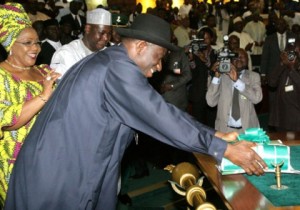2013 Budget: FG’s $7.9 billion Borrowing Plan comes under Fire
With the Global trend of debt crisis from Greece, Spain, Italy, Japan and possible fears of a fiscal cliff in the United States of America over its high debt profile the intention of the Federal Government to make a proposal for a $7.9billion foreign loan has come under new round of criticisms.
Last week the Senate cautioned the Federal Government on the need to curb its Foreign borrowing as the consequences if not managed properly could be dire on the Nation’s political economic future.
Senior Advocate of Nigeria and Human rights activist Mr Femi Falana alongside the Northern Rainbow Coalition in separate statements decried the plan by the Government to get another loan thereby increasing the country’s borrowing cost.
In a letter to Senate President, David Mark, dated 15, November 2012, Mr Falana urged the National Assembly to Compel the Federal Government to harness all illegally deducted funds, subsidy theft funds and other oil theft funds from the manipulations of the multinationals which amount to billions of dollars, should be recovered by Government and channeled to the development programs that the foreign loan is intended for.
The Northern Rainbow Coalition President Alhaji Abdul Ahmed shared the concern of economics scholars like Prof Paul Coullier of the Oxford University that Nigeria with soaring and steady revenue from Oil should desist from borrowing but rather look at priority areas that will revitalize the key sectors of the economy like power, job creation, and improved technology.
From an International economic perspective it is very dangerous for Nigeria to borrow without considering the dynamics and future trends of what may happen to its major revenue the oil sector in terms of crude price volatility and the uncertainties, coupled with Internal and external shocks.
This is aside the over $20 billion owed by State Governments on projects they got loans for which have not been completed and some even abandoned making the loans nonviable and creating a debt burden which the Obasanjo Administration struggled to eradicate.









